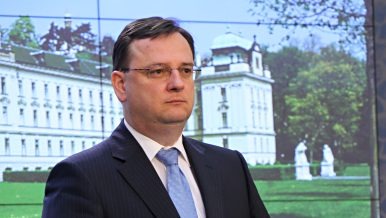The three defendants were charged with bribery, which carries a maximum prison sentence of up to six years. Photo credit: Freepik.
Prague, June 14 (CTK) – Yesterday, the Prague 1 District Court found former Czech PM Petr Necas (ODS), his wife Jana Necasova (formerly Nagyova) and another defendant, former deputy agriculture minister Roman Bocek, guilty of handing out lucrative posts to ODS MPs in exchange for bribes, and imposed suspended sentences and fines on all three defendants.
However, the verdict has not taken effect, as Necas’s defence lawyer Adam Cerny appealed it on the spot. The other defence lawyers and the public prosecutor are currently considering whether to appeal.
The three defendants were charged with bribery, which carries a maximum prison sentence of up to six years. The public prosecutor proposed suspended sentences and fines in this case.
All three pleaded not guilty.
The court imposed a 2.5-year suspended sentence and a fine of CZK 1 million on Necas, while Necasova and Bocek were each given a two-year suspended sentence and a fine of CZK 300,000.
The court also barred both Necas and Necasova from holding high posts in state administration for ten years.
The case contributed to the fall of the Necas government in 2013, after a police raid on the Government Office.
According to the indictment, Necas, his cabinet head Nagyova, and Bocek promised ODS MPs Marek Snajdr, Petr Tluchor and Ivan Fuksa lucrative posts in return for resigning their seats in the lower house and thus enabling the passage of the government tax package, which they opposed. After the package was passed, Snajdr became the chairman of the Cepro state company’s supervisory board and Fuksa a member of the board of directors of Czech Aeroholding.
“The facts in the case have been unequivocally proven,” said court panel chairwoman Anezka Pudilova.
She said the court had relied not only on wiretap recordings of the defendants, but also on other evidence. In particular, it was possible to establish from the recorded conversations that when talking to the three “rebel MPs”, ordinary political negotiations had moved to an “informal” level, she noted, describing the defendants’ conversation as clearly conspiratorial.

According to the judge, there was no doubt that Necas, Necasova, and Bocek had all committed criminal activities, and that the latter two were not only mediators in the talks with the MPs, but were often more active than the former PM himself. Necasova’s motivation was illustrated in particular by one of her text messages, in which she wrote that she was “the only one working hard to keep the world theirs,” Pudilova added.
Justifying the sentences, the court took into account the time it had taken to bring the prosecution to trial. “This case is not only a failure of political leaders and senior officials, but also a failure of the judiciary,” Pudilova said.
However, the judge said the aggravating circumstance was that the trio had not acted in an effort to stabilise public finances, but were motivated by the desire to maintain political power.
Cerny said he did not agree with the court’s conclusions and its legal assessment of the case. “There was no bribe,” he said. He argued that the offer of a job could not be a bribe. Moreover, he said he considered the sentence imposed to be too severe.
Necas was convicted in another case in May, when he was given a one-year suspended sentence and a fine of CZK 100,000 for giving false testimony on behalf of his wife in a case of abuse of power related to use of military intelligence. He thus became the first former Czech prime minister to be convicted in a criminal case.
According to the charges, Necas’s former mistress and former head of his PM’s office Nagyova illegally ordered intelligence officers to shadow his first wife Radka, as well as two Government Office employees. Necasova was also given a suspended sentence and a professional ban in the same trial, but previous president Milos Zeman pardoned her before the end of his term in office, remitting the rest of her probation.
The police raid on the Government Office, the Defence Ministry and a number of other locations during the night of 13 June 2013 led to the fall of the Necas government and his resignation as ODS leader. Subsequently, many charges were brought and court proceedings began, some of which are still ongoing.
This incident caused major turbulence on the domestic political scene, paving the way for new parties including the ANO movement of ex-PM Andrej Babis and Tomio Okamura’s far-right Freedom and Direct Democracy (SPD). It also weakened trust in the existing mainstream parties, including the Social Democrats and the Civic Democrats. The opportunity was used by President Zeman who appointed a caretaker government.







